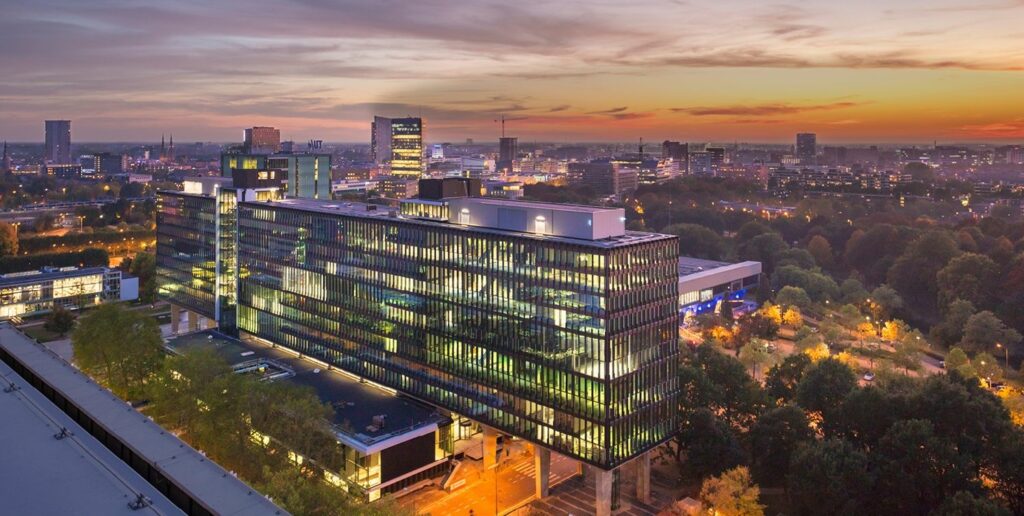Job description
Section description
The research activities of the section Mechanics of Materials concentrate on the fundamental understanding of various macroscopic problems in materials processing, forming and application, which emerge from the physics and the mechanics of the underlying microstructure of the material. The main challenge is the accurate prediction of mechanical properties of materials with complex microstructures, with a direct focus on industrial needs. The thorough understanding and modelling of ‘unit’ processes that can be identified in the complex evolving microstructure is thereby a key issue. The section has a unique research infrastructure, both from an experimental and computational perspective.
The overarching project: ‘Data Enhanced Physical models to reduce MATerials use’ (DEPMAT)
Society calls for an increased recycling of material in steel production processes to reduce the huge CO2 footprint. Current physics-based material models for predicting mechanical properties based on composition and thermo-mechanical history are too simple or too computationally expensive for use in industry. The DEPMAT project aims to develop physics-informed, data-based (machine learning and artificial intelligence) methods for superior accuracy and speed, to enable predictive modelling in industry and to increase recyclability in steel making. We are building a team of talented, enthusiastic researchers to achieve this exciting goal.
PhD vacancy with a focus on Fast micromechanical models for data-enhanced materials engineering
Macro-scale mechanical properties of steels are predicted by high-fidelity numerical models of micro-scale material domains. Representative Volume Elements (RVE) of the multiphase metallic microstructures are generally used for this purpose, in which the individual grains are typically represented by state-of-the-art single-crystal plasticity models. Their input generally consists of the phase distribution in space, orientations of the individual crystals, chemical composition of the phases, etc. The main output of interest is the mechanical behaviour of the (in silico) material. The significant computational cost of these numerical models is due to the complexity of the (three-dimensional) microstructural geometry and constitutive modelling, together with the fine spatial and temporal discretization required to solve them. The goal of this numerical PhD project is to speed up the micromechanics simulations substantially (at least two orders of magnitude), at the cost of some (but not too much) of the fidelity of the detailed modelling. This acceleration of the RVE models is to be achieved by combining dedicated computational reduction methods akin to reduced order modelling to exploit the similarity of different realizations of statistically similar microstructures with careful idealization of the microstructural geometry and constitutive behaviour – e.g. where possible eliminate irrelevant details from the geometry, exploit symmetries, replace crystal plasticity by isotropic plasticity, replace (coupled) damage models by damage indicators, etc. Each of these reduction methods needs to be carefully assessed.
Job requirements
- Talented, enthusiastic candidates with excellent analytical and communication skills holding a university degree (MSc, with high grades) in Mechanical Engineering, Computational Mechanics, Computational Physics, Numerical Mathematics or Applied Mathematics are encouraged to apply.
- A background and strong interest in mechanics of materials is required.
- Experience in multi-scale modelling and micromechanics, and experimental mechanics is of benefit.
- Interest to work in an interdisciplinary project.
- Excellent oral and writing skills in English.
Conditions of employment
A meaningful job in a dynamic and ambitious university, in an interdisciplinary setting and within an international network. You will work on a beautiful, green campus within walking distance of the central train station. In addition, we offer you:
- Full-time employment for four years, with an intermediate evaluation (go/no-go) after nine months. You will spend 10% of your employment on teaching tasks.
- Salary and benefits (such as a pension scheme, paid pregnancy and maternity leave, partially paid parental leave) in accordance with the Collective Labour Agreement for Dutch Universities, scale P.
- A year-end bonus of 8.3% and annual vacation pay of 8%.
- High-quality training programs and other support to grow into a self-aware, autonomous scientific researcher. At TU/e we challenge you to take charge of your own learning process.
- Intensive collaboration within a consortium of academic and industrial partners – in particular at TU Delft and Brown University.
- An advanced PhD-level training program in the field of Engineering Mechanics, organized by Dutch Graduate School on Engineering Mechanics (engineeringmechanics.nl).
- An excellent technical infrastructure, on-campus children’s day care and sports facilities.
- An allowance for commuting, working from home and internet costs.
- A Staff Immigration Team and a tax compensation scheme (the 30% facility) for international candidates.
Information and application
About us
Eindhoven University of Technology is an internationally top-ranking university in the Netherlands that combines scientific curiosity with a hands-on attitude. Our spirit of collaboration translates into an open culture and a top-five position in collaborating with advanced industries. Fundamental knowledge enables us to design solutions for the highly complex problems of today and tomorrow.
Information
Do you recognize yourself in this profile and would you like to know more?
Please contact dr. Ron Peerlings (r.h.j.peerlings[at]tue.nl) or prof. Marc Geers (m.g.d.geers[at]tue.nl)
Visit our website for more information about the application process or the conditions of employment. You can also contact HRServices.gemini[at]tue.nl.
Are you inspired and would like to know more about working at TU/e? Please visit our career page.
Application
We invite you to submit a complete application by using the apply button. Application documents (in PDF format) must contain a:
- letter of motivation,
- detailed curriculum vitae including photograph,
- transcripts of BSc and MSc degrees (with grades),
- and contact information of two potential referees.
We look forward to receiving your application and will screen it as soon as possible. The vacancy will remain open until the position is filled.
